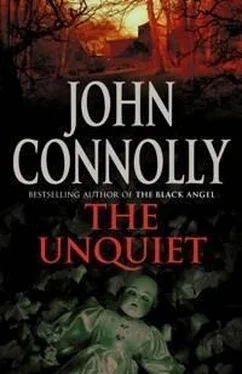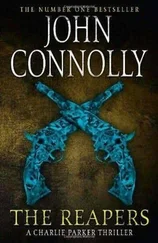“So what’s the compromise?”
“We warn him off, make sure the order is ready to be served, and set him free. It’s a small city. He’s not going to disappear. We’ll arrange for someone to stick close to him for a while, and see what happens.”
It didn’t sound like the perfect plan. Nevertheless, it looked like I had just been given an extra ninety-six hours at most without Merrick to worry about. It was better than nothing.
“Let’s hear what he’s got to say for himself first,” I said. “You cleared it for me to watch?”
“Didn’t take much doing. Seems like you still have friends in Scarborough. You spot anything in what he says, then you let me know. You think he’ll call a lawyer?”
I thought about it. If he did decide to lawyer himself up, it would have to be through Eldritch, assuming the old man was licensed to practice in Maine, or had someone in the state who was prepared to do a little quid pro quo work when necessary. But I had a feeling that Eldritch’s support for Merrick had always been conditional, and Merrick ’s recent actions might have forced the lawyer to reconsider his position.
“I don’t think he’s going to talk much anyway.”
O’Rourke shrugged. “We could hit him with a telephone book.”
“You could, but I’d have to report you to IA.”
“Yeah, there’s that. I’d have to lose the paperwork on myself. Still, it’s Scarborough ’s turf. We can stand back and see how they handle it.”
He got in his car. The Scarborough cruisers were pulling away, the Portland cops close behind.
“You coming?” he asked.
“I’ll follow.”
He left, the crowd dispersed, and suddenly I was the only person in the parking lot. The cars rolled by on Route 1, and the neon Big 20 sign illuminated the lot, but behind me was the darkness of the marshes. I turned, gazing into it, and I couldn’t shake the feeling that, from its deepest reaches, something stared back at me. I walked to my car, started the engine, and tried to leave that sensation behind.
Merrick was seated in a small square room furnished with a white table bolted to the floor. There were three blue chairs around it, and Merrick sat in the one facing the door, the two empty chairs across from him. A wipe-clean board was attached to one wall, its surface covered with children’s doodles. There was a phone beside the door and, high in one corner, a video camera. The room was also wired for sound recording.
Merrick ’s hands had been cuffed, and the cuffs had in turn been chained through a D-ring on the table. He had been given a soda to drink from the machine beside the evidence technician’s office, but he hadn’t touched it. While the room didn’t have a two-way mirror, we were able to watch him on the computer monitor in a partitioned office close by the interview room. We weren’t alone. Although the alcove was big enough for four people at best, almost three times that number were crowded around the screen, trying to catch a glimpse of their new guest.
Detective Sergeant Wallace MacArthur was one of them. I knew him from way back. Through Rachel, I’d introduced him to his wife, Mary. In a way, I had nearly been responsible for her death, too, but Wallace had never held that against me, which was pretty Christian of him, all things considered.
“Not often we get a living legend in here,” he said. “Even the Feds have joined us.”
He jerked a thumb in the direction of the door, where Pender, the new SAC of the small Portland field office, was talking with a man whom I didn’t recognize but whom I took to be another agent. I had been introduced to Pender once at some policeman’s benefit in Portland. As far as the Feds went, he seemed okay. Pender nodded to me. I nodded back. At least he hadn’t tried to have me thrown out, which was reason to be thankful.
MacArthur shook his head in something like admiration. “ Merrick ’s old school,” he said. “They don’t make ’em like him anymore.”
O’Rourke grinned emptily. “Yeah, what have we come to when we can look at someone like him and think, hell, he’s not so bad? He just popped them, neatly and cleanly. No torture. No women. No kids. Just men that somebody figured had it coming.”
Merrick kept his head down. He did not look up at the camera even though he must have known that we were watching him.
Two Scarborough detectives entered the room, a beefy guy named Conlough and a woman named Frederickson, who had made the formal arrest at the Big 20. As soon as they began to question him, Merrick, contrary to expectations, looked up and answered them in soft, civil tones. It was almost as though he felt the need to justify and defend himself. Perhaps he was right. He had lost his daughter. He had the right to ask where she might be.
Conlough: What’s your interest in Rebecca Clay?
Merrick: None, beyond who her daddy is.
C: What’s her father to you?
M: He treated my little girl. Now she’s gone. I want to find out where she is.
C: You think you can do that by threatening a woman? Real big guy, huh, stalking a defenseless woman?
M: I didn’t threaten anyone. I didn’t stalk anyone. I just wanted to ask her some questions.
C: So you do that by trying to bust into her house, breaking her window?
M: I didn’t try to bust into her house, and the window was an accident. I’ll pay for the damage
C: Who put you up to this?
M: Nobody. I don’t need no one to tell me that what happened ain’t right.
C: What’s not right?
M: That my daughter could disappear and nobody give a rat’s ass about finding her.
Frederickson: Maybe your daughter ran away. From what we hear, she was having problems.
M: I told her I’d look out for her. She had no cause to run away.
C: You were in jail. How were you going to look out for her from a cell?
M: (silent)
F: Who gave you the car?
M: A lawyer.
F: Which lawyer?
M: The lawyer Eldritch, down in Massachusetts.
F: Why?
M: He’s a good man. He thinks I got the right to ask questions. He got me out of trouble in Virginia, then helped me when I came back up here.
C: So he gives you a car out of the goodness of his heart. What is he, St. Vincent de Paul’s lawyer?
M: Maybe you should ask him.
C: Don’t worry, we will.
“We’ll talk to the lawyer,” said O’Rourke.
“You won’t get much from him,” I said.
“You’ve met him?”
“Oh yeah. He’s old-school too.”
“How old?”
“So old they built the school out of wattle and daub.”
“What did he tell you?”
“Pretty much what Merrick just said.”
“You believe him?”
“That he’s a good guy who gives away cars to deserving causes? No. Still, he said that Merrick had been one of his clients, and there’s no law against loaning a car to your client.”
I didn’t tell O’Rourke that Eldritch had another client, one who seemed to be covering Merrick ’s tab. I figured he could find that out for himself.
A call came through from the evidence technician. Merrick ’s car was clean. There were no weapons, no incriminating papers, nothing. Frederickson emerged from the interview room to consult with O’Rourke and the FBI man, Pender. The man who had been talking with Pender listened in, but said nothing. His eyes flicked to me, regarded me for a moment, then returned to Frederickson. I didn’t like what passed between us with that look. O’Rourke asked me if there was anything that I thought we should put to Merrick. I suggested asking him if he was working alone, or if he had brought other men with him. O’Rourke seemed puzzled, but agreed to suggest the question to Frederickson.
F: Ms. Clay has taken out a court order against you. Do you understand what that means?
Читать дальше












